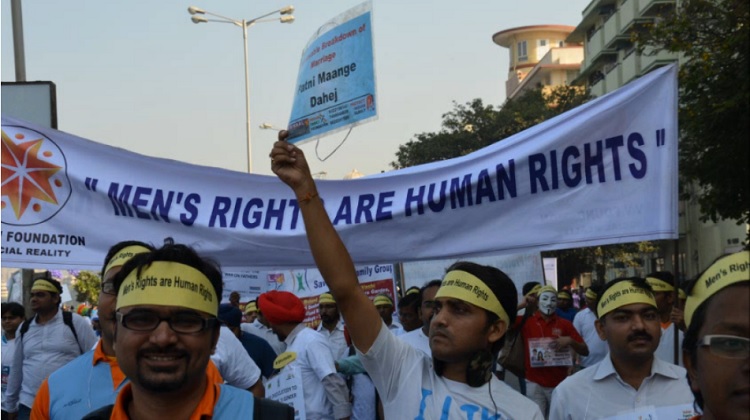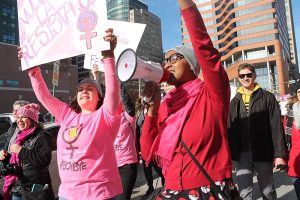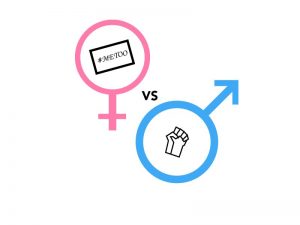Letter to the Editor: Rebuttal to Rowland’s ‘Why we should all be feminists’
By Peter Wright – India MHRM commons,
CC BY-SA 2.0, https://commons.wikimedia.org/w/index.php?curid=35910066
September 5, 2019
The fact that Gracie Rowland spoke on men’s rights issues means she deserves a lot of credit. Many people, especially feminists, ignore or even refuse the idea that men’s lives are riddled with societal issues. Fast clap. However, the majority of her Aug. 22 piece on feminism lacked sources to verify – albeit not required. Slow clap. What’s worse, very few of the statistics she presented were true in context. No clap.
Rowland claims that all of us should be feminists. Through the years, two waves of feminists have fought for women’s rights: the first wave focused on women’s suffrage, the second pushed workplace equality and general civil rights. The third and fourth (there is no consensus on whether this is a separate wave or simply an extension of the third) waves, however, claim economic discrimination is still an issue while also saying the patriarchy, rape culture, body shaming, and other forms of hate speech are real problems.
In the opening paragraphs, Rowland cites the World Economic Forum’s (WEF) Global Gender Gap Index for 2018 by saying there is still 170 years until gender equality is reached across the globe in the categories of “education, health, political empowerment and economic participation.” Upon further inspection of the source material and cross-referencing data, many of these issues seem to be irrelevant or improperly explained.
Education
“At least 20% of women are illiterate in 44 countries,” WEF says. According to the CIA, that number is 37, and of those 37 countries, at least 20% of men are illiterate in 23 of them. Based on the WEF’s own standards, female illiteracy is a minor issue; illiteracy in general is the true problem. The WEF also states that percentages for secondary and tertiary education among all 149 tested countries are within 5%, with men trailing women. It appears that even though many men and women are illiterate in many countries, women who are literate still pursue and achieve higher education at higher rates than men.
Health
WEF measured health on two metrics, the at-birth sex ratio (women born divided by men born) and healthy life expectancy (women divided by men). The sex ratio, weighted as 0.693 out of 1, is largely irrelevant as this does not affect quality of life for women nor men. The sex ratio is only relevant biologically, as a species with a low number of females is on the track for extinction. Life expectancy was also measured in a deceiving manner. WEF sets a benchmark for true parity which, in most cases, is 1. However, they recognize women have a longer life expectancy than men, so “in the case of healthy life expectancy the equality benchmark is set at 1.06. Truncating the data at the equality benchmarks for each assigns the same score to a country that has reached parity between women and men and one where women have surpassed men.” They justify manipulating their own data by saying, “This ratio is based on the standards used in the UNDP’s Gender-Related Development Index, which uses 87.5 years as the maximum age for women and 82.5 years as the maximum age for men.” Again, they recognize women live longer than men, so they have to purposefully give women less credit in order to make it appear as if women have it worse in this area.
Political Empowerment
The measurements in this category are the ratio of women to men in parliamentary/ministerial positions and how many of the last 50 years a woman has been the head of state. I raise you this question: what if women simply don’t want to participate in politics as much as men? There are 195 countries in the world. Out of the 193 countries with national legislatures (2 do not participate), all 193 allow women to vote, and all 193 countries currently have women elected to federal parliamentary positions. Encouraging women into a field or position they don’t desire for the sake of numbers, not caring about their choice not to, and criticizing others because of it sounds a lot like toxic femininity and even sexism to me.
Economic Participation
This category is determined by women’s participation in the labor force, with heavy emphasis on technical and professional work. Again, the WEF is making very large assumptions here that women want to work the same jobs in the same fields as men and in the same amounts. This is the second time that the WEF has implied that women having agency over their decisions is detrimental to them.
Next, Rowland presents data on the atrocity that is rape. “In the US, one in five women and one in 71 men will be raped in their lifetime,” she says. According the CDC, this is true; however, the current definition of rape, according to the US Department of Justice, does not protect a man who someone forces themselves on. This means that a woman (or man) who forces themselves onto a man, conscious or incapacitated, did not commit rape according to the Department of Justice’s definition of rape. Fixing this definition is a major issue, as the CDC also states, “approximately 1 in 21 men (4.8%) reported that they were made to penetrate someone else during their lifetime.” Even if none of these men overlap, that is still 1 in 50 men being victims of rape. I recognize that it is still 10 times more women by percent, but rape in any number is wrong. There is also a large difference in how society views rape by the genders. Feminism has drastically changed the doctrine of “innocent until proven guilty” to “guilty when accused” because of the #MeToo movement and #BelieveAllWomen. The idea of believing all possible rape victims, female or male, is extremely dangerous because a simple allegation has the potential to ruin lives. Many of the recent high profile cases have turned out to be false, but the damage had already been done.
Case 1: Brett Kavanaugh. Although Kavanaugh was confirmed to the Supreme Court in the end, the circumstances surrounding his accusation are extremely problematic. Dr. Christine Blasey Ford claimed to have three witnesses to support her allegation, although two said they did not know her and one said she was lying. She claimed to have not remembered a decent portion of the event, and her story continuously changed. Ford did not tell the police; instead, she chose to go to the court of public opinion, telling the media of her “rape.” There were many other small discrepancies, but the most condemning thing is almost immediately after Kavanaugh’s confirmation, Ford dropped the case. Although Kavanaugh was neither charged nor acquitted, these allegations have still destroyed his reputation.
Case 2: Two Rhodes College football players. In February 2019, two football players were falsely accused and subsequently not allowed to graduate college due to it. They sued this past summer and a settlement was reached.
Case 3: Expelled USC student. In November and December 2018, the University of Southern California (USC) expelled a male student accused of rape without questioning the victim and “witnesses” or gathering evidence.
The next case could be any of us men. The feminist movement has allowed, and even called for, false allegations to be made.When we must “believe all women” regardless of evidence, falsely accused men are almost always socially punished, and sometimes judicially punished, while the female accusers are typically set free.
Now to address the ever present “wage gap.” This has been debunked numerous times, so a simple summary is in order. Women, on average, work less hours (meaning less overtime), accept lower paying jobs, negotiate lower wages and request fewer raises than men. The “wage gap” was calculated by comparing the total annual income of all women to the total annual income of all men, without regard to the job being performed.. This means teachers are compared to CEOs, nurses and fast food employees. The Pew Research Center (PRC) found their own calculations of the wage gap to be very similar to the Bureau of Labor Statistics’s (BLS) research. “According to their [BLS] data, women are twice as likely as men—26% versus 13%… women who are paid an hourly rate earned 86% as much as men who are paid an hourly rate; women working part-time earn 104% as much as men working part-time; and, at the extreme, women who worked five to nine hours in a week earned 119% as much as men who worked the same number of hours.” PRC says, “some of it is due to differences in the types of jobs… women may not negotiate for higher wages as aggressively as men or they may be more likely to trade off higher wages for other amenities, such as flexible work hours.” This shows that the wage gap is not due to gender discrimination. When all the discrepancies are balanced, women will generally earn more than men. In that case, I suppose the wage gap is real and hurts men, not women.
Rowland says feminism does not strive to “step on men” and that our societal beliefs negatively impacts us. I agree, the goal of feminism is not to belittle men; it is simply to give women the male experience with no consequences. Women want to be career women and mothers at the same time, but research shows that’s almost impossible. She talks about how men are told to not cry, to “man-up” and to not share emotion, but when raised properly, men are told not to do these things in public. Boys and girls need both a father and a mother in their lives, studies show. The role of the mother is to nurture and teach their children to be outgoing and emotional, while the father teaches physical play. Gender roles, like most other stereotypes, exist for a reason. According to the Census Bureau, only 9.3 percent of families with children are motherless. Men not being taught to handle emotions well is mostly the fault of mothers in this gynocracy that we call the US.
So go ahead, call yourself an egalitarian. Fight for true equality of the sexes. Allow choice to be our goal, not balancing numbers like society is some huge checkbook. Bring attention to issues affecting both genders. Make progress towards a truly free and equal future. Investigate all of men’s claims of sexual and domestic assault in earnest. Award custody based on who is better able to care for the children. Stop awarding women exorbitant settlements in divorces when she brought and contributed very little financially. Stop pushing women to be politicians and career women if they don’t want to be. Fight to end female genital mutilation in Africa. End mistreatment of Middle Eastern women under Sharia Law. Fight for things that actually affect the wellbeing of humans across the globe.
Men and women are biologically different and cannot be the same, and there is nothing wrong with that. How about we make sure everyone can choose to live however they want?










